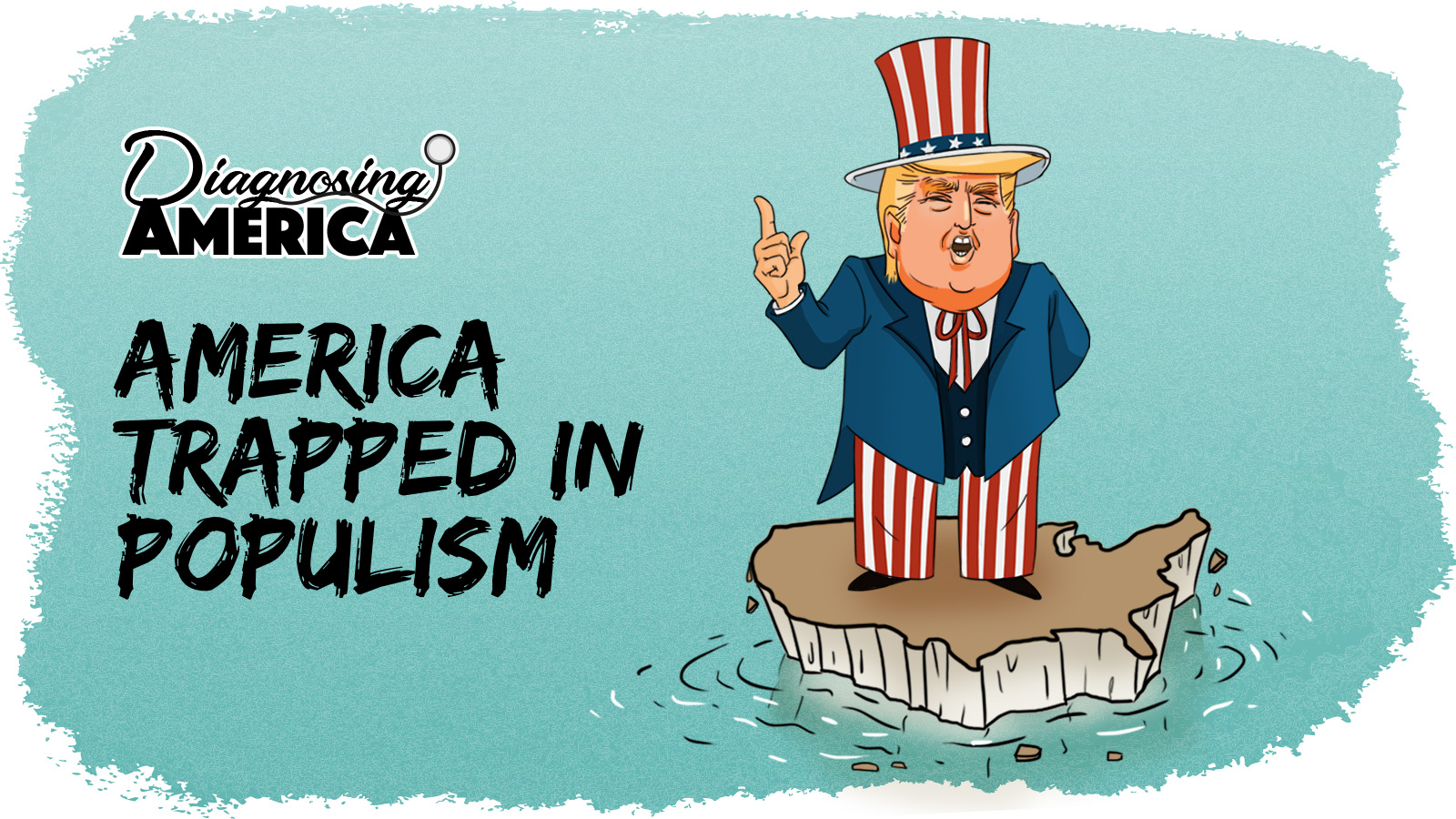
Editor's note: Waging tariff fights, quitting international bodies, sowing dissent between the EU and Russia, confronting China on all fronts, the United States is rewriting its global role under Donald Trump. Is the country becoming a source of unrest in the world? CGTN Insight introduces Diagnosing America, a mini-series investigating what lies behind the United States' repeated challenges to the international order. The fourth episode is on rising populist sentiments in the United States.
Since the Trump administration came into power, its "America First" policy has driven rising populism inside the country. Nativism, xenophobia, and racism all experienced an upsurge during the COVID-19 pandemic as the administration adopted a buck-passing tactic to cover up its belated and insufficient response to the pandemic.
COVID-19 has been repeatedly labeled as the "China virus," the CDC has been charged with incompetence, and the Democratic Party was accused of using the virus as a "hoax" to attack Trump and his administration. The Asian community in the country has been seriously marginalized and treated unfairly, suffering verbal abuse and physical attacks, sometimes even lethal.
A poll conducted in June by researchers at the University of Chicago in association with the Associated Press showed that more than 60 percent of Americans say the president is dividing the nation as the COVID-19 and racial tensions escalated. Nevertheless, it takes more than one cold day for the river to freeze. Problems were already emerging long before Trump even considered running for president. The biggest underlying reason is the imbalance in the U.S. economy. What Trump did was to add fuel to the fire of populism and make use of it in an attempt to win over the majority of voters.
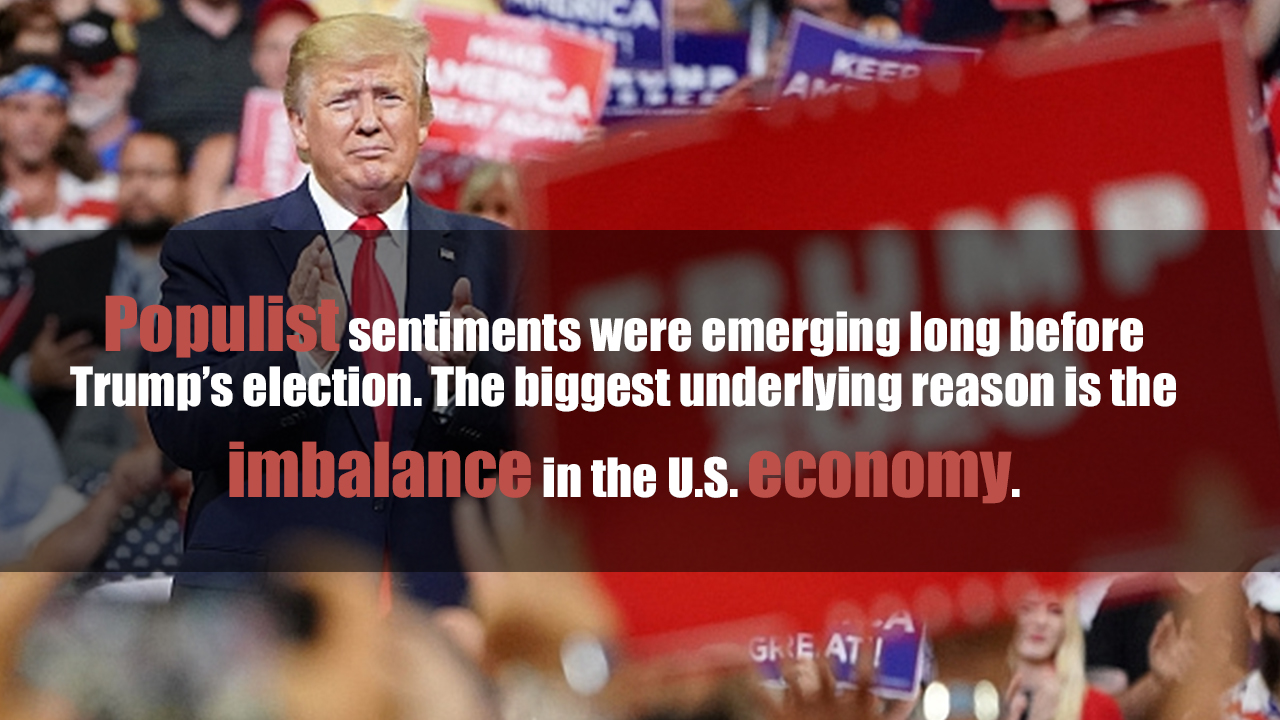
Fortune and misfortune, two buckets in a well
The U.S. economy experienced robust growth during President Bill Clinton's tenure between 1993 and 2001. His policies including tax hikes on higher income taxpayers and defense spending cuts helped bring the federal budget into surplus during his second term, the only surplus years after 1969.
However, the introduction of several acts, including the Gramm-Leach-Bliley Act and the Commodity Futures Modernization Act, to deregulate the financial sector were tantamount to unleashing a greedy beast. They facilitated the development of the financial services industry, which supported the real economy through such means as providing loans and venture capital. However, the financial sector's unchecked expansion created bubbles in the property and Internet sectors, for example, as financiers chased quick and high returns. The inflating bubbles would eventually burst.
In the meantime, Clinton's effort to push for free trade also turned out to be a double-edged sword. While the free trade deals brought American consumers cheap goods from around the world, without any effective plan to retain the relatively lower-return manufacturing sector, the government's trade deals helped to accelerate the hollowing out of the country. This is a key factor that would later contribute to the gutting of the U.S. middle class and increasing poor population.
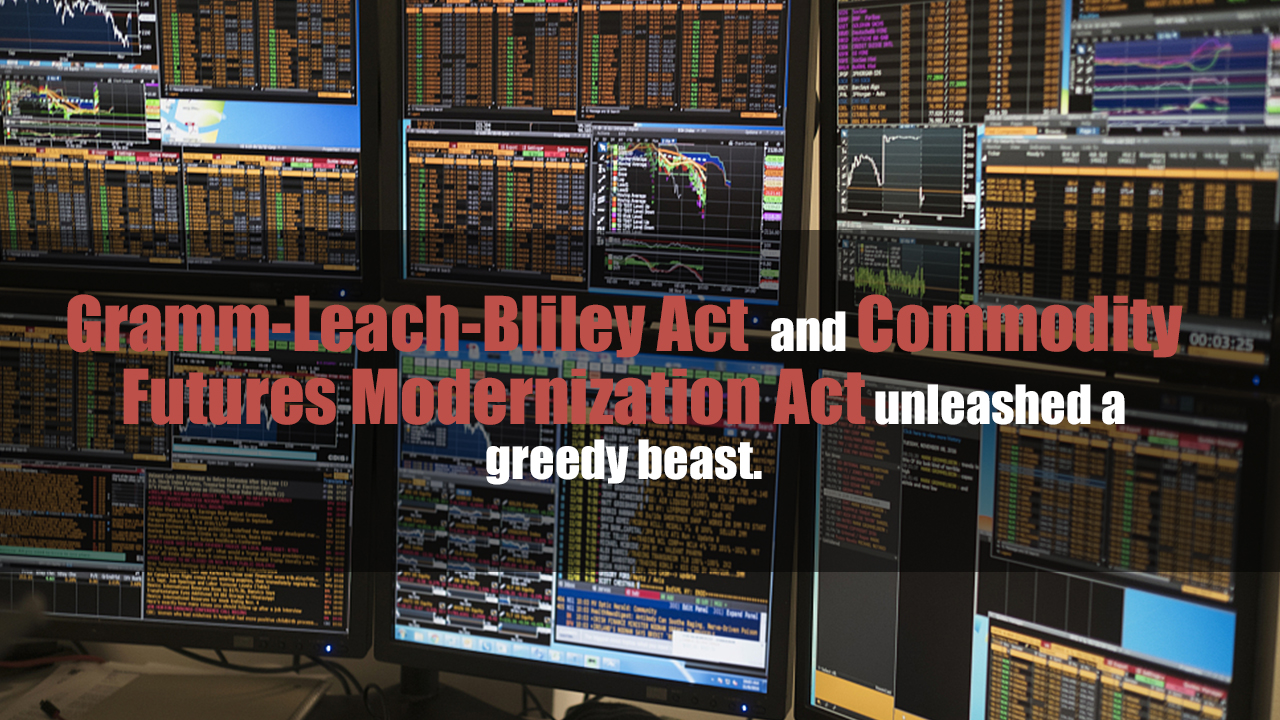
The financial crisis that stirred up populism
A fast-expanding financial sector that fails to match the real economy's growth, which includes the production, purchase and flow of goods and non-financial services, will inevitably lead to a financial crisis.
As President George W. Bush continued the deregulatory approach, the housing bubble eventually burst, triggering the crisis that swept through the world between 2007 and 2008.
According to a 2018 research published by the Harvard Business Review, when house prices collapsed in 2008, the value of U.S. middle-class households' portfolios dropped substantially, while the quick rebound in stock markets boosted wealth at the top. Further research carried out by economists with the Bonn Graduate School of Economics noted that, due to their heavy investment in equities, the top 10 percent of America's wealthiest households were the main beneficiaries from the stock market boom. They were also relatively unaffected by the drop in residential real estate prices.
The Bush administration's Troubled Assets Relief Program, introduced in October 2008 to purchase toxic assets from banks, eventually stabilized the country's financial system. Still, analysis released by the Dallas Federal Reserve in 2013 said that the financial crisis cost the U.S. economy six trillion U.S. dollars to 14 trillion U.S. dollars – and possibly twice that – along with untold expenditure to bail out the too-big-to-fail banks. According to the analysis, that translates to 50,000 U.S. dollars to 120,000 U.S. dollars for every U.S. household "or the equivalent of 40 to 90 percent of one year's economic output."
Throwing a lifeline first to the financial institutions, in connection with the crisis with the taxpayers' money, worsened the wealth inequality problem in the country, triggering public anger towards the government, as well as Wall Street elites. Populist sentiment, which is often associated with mass movements, anti-establishment, anti-elite and pushes the distrust of experts, was therefore stirred up, with the 2011 Occupy Wall Street movement giving a major boost to populism.
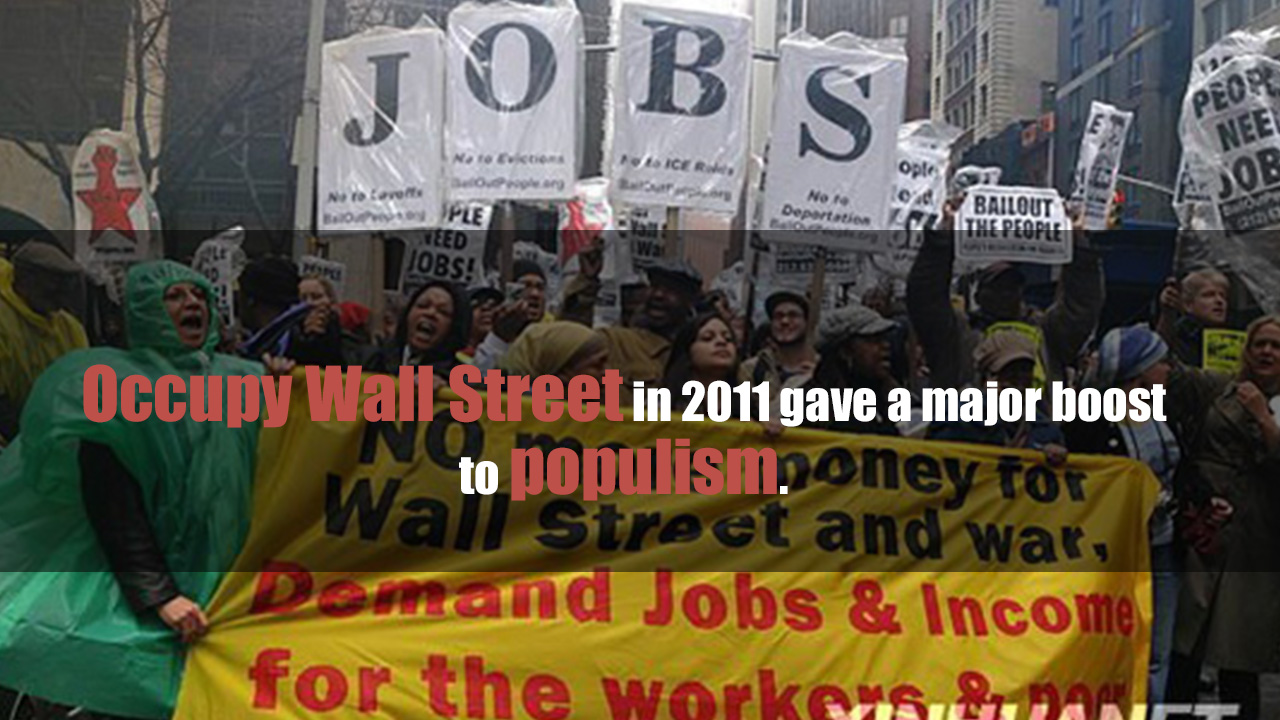
Administration that aggravated the situation
The Obama administration did take steps to boost oversight of the financial industry, as well as try to reduce wealth inequality and increase public welfare. They introduced measures that extended healthcare coverage and raised taxes on the rich, but the impact of those policies was limited due to resistance from different parties, such as the bankers on Wall Street. The wealth gap continued to widen while the number of middle-class families continued to shrink.
Analysis released by the Pew Research Center in February showed that the richest families were the only ones whose wealth increased in the years following the 2008 Financial Crisis.
Economists from the Paris School of Economics and the University of California, Berkeley published a paper in December 2016, which found that the bottom half of the U.S. nation had been shut out from income growth for 40 years. In the same year, a Pew survey found that 62 percent of Americans thought their children would be worse off than they are. Impoverished Americans were 20 times less likely to believe hard work would get them ahead compared to the poor in Latin America.
With such a dim outlook, the media was lamenting the death of the American Dream. When a populist candidate, who was full of anti-establishment ideas and xenophobic rhetoric, promised to "Make America Great Again," it is no wonder that he gained so much support from the medium- and low-income working-class.
When a candidate or president scapegoats other countries or immigrants for any problem he can think of, whether unemployment, high crime rates, high deficits, high contraction or even virus death rates, the already strong populist sentiment, which also advocates nationalism and vilifies outsiders, will be stoked and further enflamed.
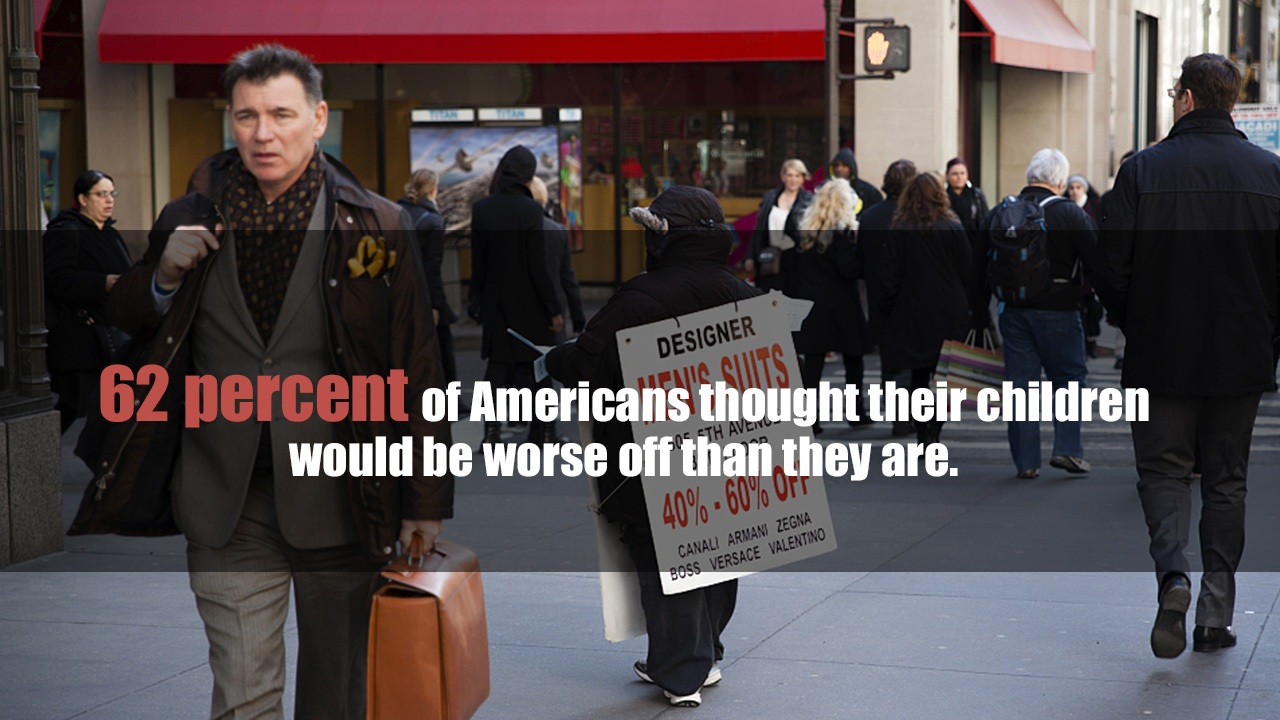
The negative impact and the solution
However, rising populist sentiment, most notably xenophobia, has been tearing the nation apart, especially during the COVID-19 pandemic, and will have the opposite effect of what the Trump administration had hoped for.
The distrust in the elite and experts led to the country missing the window of opportunity to put in place effective measures to contain the spread of the virus at an early date. It was followed by backlashes against scientific advice to wear face masks and a small-minded insistence on labeling COVID-19 the "China virus." This all sowed fear and anger against the local Asian community, further dividing the nation at a time when solidarity is needed most.
Furthermore, attempts to monopolize COVID-19 vaccines, a derivative of the populist "America First" policy, exposed the selfishness of the United States, severely undermining its reputation as a global leader that it has built up over decades.
Rising populism, together with nativism, nationalism, unilateralism and protectionism, will not necessarily reinforce the country's strength as it's strongly associated with anti-intellectualism. Instead, there is a risk of the nation getting embroiled in external conflicts, maybe even militarily, if right-wing populist sentiment continues to propel decision-makers without restraint. Lessons should be learnt from history.
Preventing the nation from going too far down the populist path and solving the problem of populist rampage cannot be achieved overnight. To embark on the right track, as United Nations Secretary-General Dr. António Guterres pointed out at the UN Annual Parliamentary Hearing early last year, governments must understand the grievances and get to the root causes of why large sectors of the population feel abandoned.
"We need to show people that we care and that we have not forgotten or forsaken them. We need to show that politics is a noble undertaking and not merely the pursuit of power. We need to demonstrate that our ideas, policies and programs aim at solving their problems," said Guterres.
More in this series:
Pathogeny for U.S. withdrawal fever
Partisan politics drags U.S. towards failed-state status
Trump against Europe: Weaponizing the relationship for his benefit
(If you want to contribute and have specific expertise, please contact us at opinions@cgtn.com.)